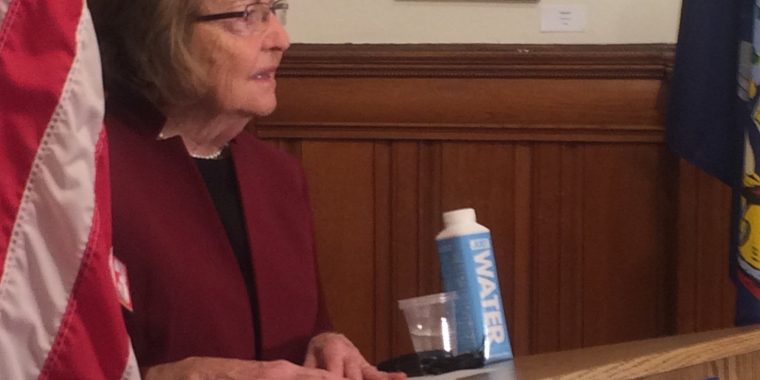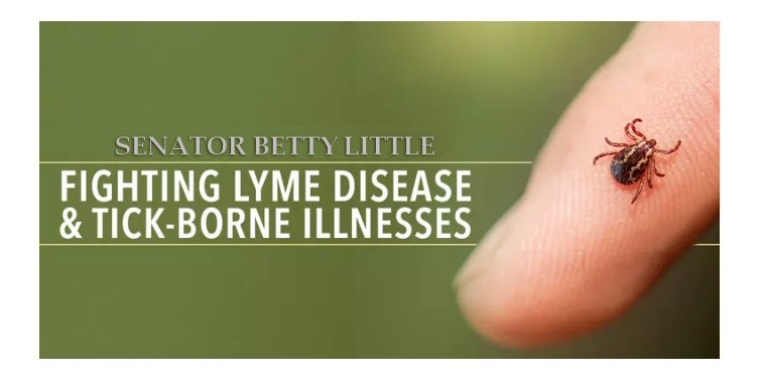
Senate task force makes recommendations to address Lyme Disease
Betty Little
June 18, 2014
-
ISSUE:
- Health

Senator Betty Little, a member of the New York State Senate Task Force on Lyme and Tick-Borne Diseases, joined her colleagues today in releasing a report that provides a comprehensive set of recommendations for a state action plan to enhance research, prevention, diagnosis and treatments for harmful tick-borne illnesses.
Senator Little also is cosponsoring legislation (S7854) that codifies existing state health policy by enabling the state’s Office of Professional Medical Conduct (OPMC) to maintain a flexible, case-specific, investigations policy, particularly where new treatments for Lyme and other tick-borne diseases and acceptance by the medical community do not align.
The legislation would ensure that determinations of effective and appropriate treatment of Lyme and other illnesses remain in the hands of medical professionals and does not subject practitioners to OPMC identification, investigation or charges based solely on their recommendation or provision of an innovative and effective treatment.
A vote on the legislation is anticipated later today in the State Senate.
“Many of those who suffer from Lyme disease face months, if not years, of uncertainty and frustration as they seek the best course of treatment for this illness. As I learn more about Lyme, the challenge of diagnosing and treating it becomes more apparent,” said Senator Little.
"We’re calling on the federal government to take a more proactive role to help find answers to the many questions surrounding the disease. More funding is needed for research. Given Lyme’s reach into other states and its growing prevalence, a comprehensive approach is warranted.
“On the state level, we’re calling on the state Health Department to develop an action plan, which would incorporate the recommendations proposed by this task force.
“Finally, we want to ensure that doctors acting in their patients’ best interests are not unjustly targeted for professional misconduct.”
The recommendations outlined in the report include a call for additional research and data about past, current and future disease trends; increased public awareness as the reach of the diseases spread to new communities; implementation of preventive measures such as “4 Poster” devices and bait vaccines for animals to reduce the infected tick population; and measures to enhance diagnosis and treatment for those who have the diseases.
Formed in October 2013, the senate task force has reviewed research, consulted with experts, heard from the public and worked to develop legislation and 19 recommendations to be incorporated into a New York State Action Plan on Lyme and tick-borne diseases.
The action plan is similar in purpose to one created by the state Department of Health in 2001 to address the West Nile Virus outbreak, and should serve as a comprehensive roadmap for the state to prevent additional illnesses by improving research, education, diagnosis and treatment.
The recommendations include several important research initiatives aimed at prevention and better understanding of tick-borne diseases which can be fatal. Other recommendations include a public education campaign, opportunities for continuing medical education, and a county learning collaborative to encourage the sharing of best practices with counties where lyme disease is just beginning to emerge.
Additionally, a statewide conference, hosted by the Task Force later in the year, will be organized to bring together numerous universities and institutes from across the state who are already working on Lyme and tick borne disease. The conference will focus on building collaboration and data sharing between the research community and the State Health Department and increasing access to federal research grants.
Tomorrow, the Senate is adopting a resolution calling on the Centers for Disease Control to reevaluate its guidance on Lyme and other tick-borne diseases and for the National Institutes of Health, the Department of Defense, and other federal agencies to provide more funding for these diseases.
The 2014-15 state budget included $500,000 to support the recommendations being developed by the task force, and $100,000, along with supporting legislation (S2115), sponsored by Senator Patricia Ritchie (R-C, Heuvelton) and recommended by the task force, for the creation of a 21st Century Work Group for Disease Elimination and Reduction within the Department of Health.
The full report is available at www.nysenate.gov.
-30-
Share this Article or Press Release
Newsroom
Go to NewsroomArthur P. Coon
November 11, 2020

Little: 2020 agenda should focus on economy
January 9, 2020
Little will not seek re-election in 2020
December 6, 2019

